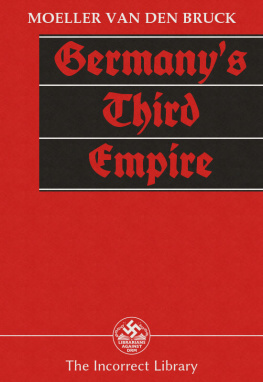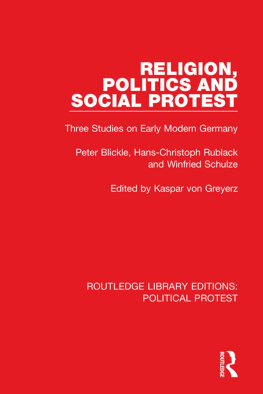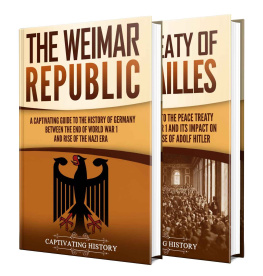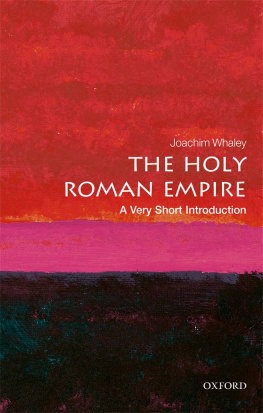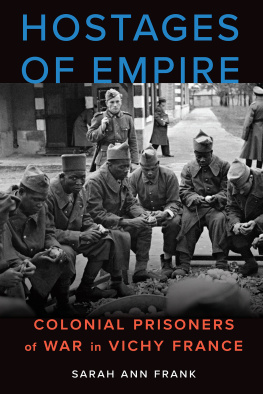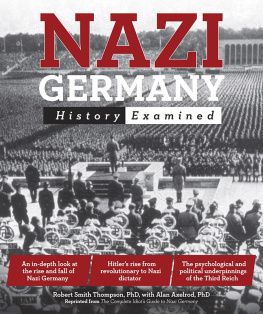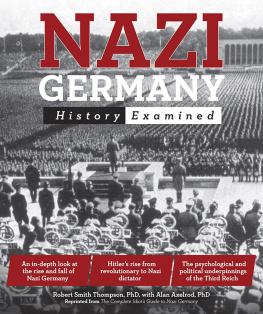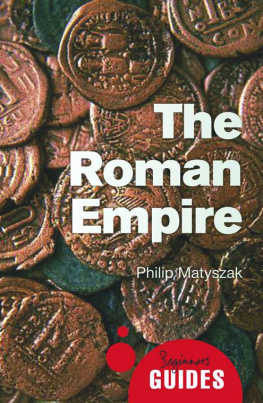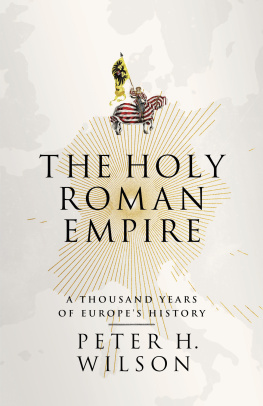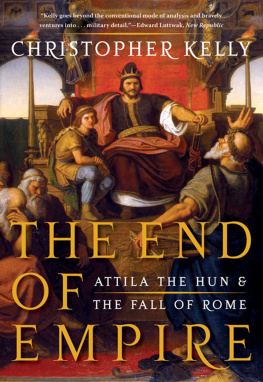Germany's Third Empire
by
Arthur Moeller van den Bruck
1934

~ All Your Books Are Belong to Us !!! ~
http://inclibuql666c5c4.onion
Germany's Third Empire
Copyright 1934 Arthur Moeller van den Bruck
Originally published in 1923 under the title Das Dritte Reich
Language: English
Translated from: German
Published: 1934
Publisher: George Allen And Unwin, London
Written in 1923, when Germany was in the throes of revolutionary demands from both the Left and the Right, Moeller van den Bruck envisioned a Germany that was radical, traditional and nationalistic. Angered by the harsh conditions imposed by the Treaty of Versailles which ended the First World War, and frustrated by the types of reforms being called for in the Weimar Republic, he examines all of the major political doctrines of his day and finds them wanting. Instead, he calls for a return to empire - not the empire of the Kaiser or the Holy Roman Empire, but an empire of all German-speaking peoples, with a social hierarchy based upon strong communal values and German traditions which nurture, rather than belittle, strong individuals. Although van den Bruck was not a supporter of the National Socialists, they ended up adopting his term Das dritte Reich for the state they intended to build. With an original Foreword and Bibliography compiled by French "New Right" founder Alain de Benoist, who explains the book's continuing relevancy, this edition makes one of the most important works of Germany's Conservative Revolution available again for the English-speaking world. This edition is a revised version of the condensed edition first published in 1934. "The greatness of a man is: to be something more than his mere self. The greatness of a nation is: to be something greater than itself, to be able to communicate something of itself; to possess something that it can communicate."-p. 14 Moeller van den Bruck (1876-1925) was primarily a man of letters who translated all of Dostoevsky's works into German for the first time, as well as an advocate of German nationalism, authoring an eight-volume history of great figures from German history. He served as a soldier in the First World War, and later as a press officer in the Foreign Ministry. After the war, he became involved in nationalist politics, becoming a co-founder of the Juniklub (June Club), one of the centers of the so-called Conservative Revolution. Following a serious illness, he committed suicide.
Contents
PREFATORY LETTER TO HEINRICH VON GLEICHEN
Dear Gleichen,
This book contains an analysis of the political parties. It is addressed to Germans of every party. It discusses their ideologies, and their party types.
The attempt this books makes was not possible from any party standpoint; it ranges over all our political problems, from the extreme Left to the extreme Right. It is written from the standpoint of a Third Party, which is already in being. Only such an attempt could address itself to the nation while attacking all the parties; could reveal the disorder and discord into which the parties have long since fatefully fallen and which has spread from them through our whole political life; could reach that lofty spiritual plane of political philosophy which the parties have forsaken, but which must for the nations sake be maintained, which the conservative must preserve and the revolutionary must take by storm.
Instead of government by party we offer the ideal of the THIRD EMPIRE. It is an old German conception and a great one. It arose when our First Empire fell; it was early quickened by the thought of a millennium; but its underlying thought has always been a future which should be not the end of all things but the dawn of a German age in which the German People would for the first time fulfil their destiny on earth.
In the years which followed the collapse of our Second Empire, we have had experience of Germans; we have seen that the nations worst enemy is herself: her trustfulness, her casualness, her credulity, her inborn, fate-fraught, apparently unshakable, optimism. The German people were scarcely defeatedas never a people was defeated before in historythan the mood asserted itself: We shall come up again all right! We heard German fools saying: We have no fears for Germany! We saw German dreamers nod their heads in assent: Nothing can happen to me!
We must be careful to remember that the thought of the Third Empire is a philosophical idea; that the conceptions which the words Third Empire arouseand the book which bears the titleare misty, indeterminate, charged with feeling; not of this world but of the next. Germans are only too prone to abandon themselves to self-deception. The thought of a THIRD EMPIRE might well be the most fatal of all the illusions to which they have ever yielded; it would be thoroughly German if they contented themselves with day-dreaming about it. Germany might perish of her Third Empire dream.
Let us be perfectly explicit: the thought of the Third Empireto which we must cling as our last and highest philosophycan only bear fruit if it is translated into concrete reality. It must quit the world of dreams and step into the political world. It must be as realist as the problems of our constitutional and national life; it must be as sceptical and pessimistic as beseems the times.
There are Germans who assure us that the Empire which rose out of the ruins on the Ninth of November is already the Third Empire, democratic, republican, logically complete. These are our opportunists and eudaemonists. There are other Germans who confess their disappointment but trust to the reasonableness of history. These are our rationalists and pacifists. They all draw their conclusions from the premisses of their party-political or utopian wishes, but not from the premisses of the reality which surrounds us. They will not realize that we are a fettered and maltreated nation, perhaps on the very verge of dissolution. Our reality connotes the triumph of all the nations of the earth over the German nation; the primacy in our country of parliamentism after the western modeland party rule. If the THIRD EMPIRE is ever to come it will not beneficently fall from heaven. If the THIRD EMPIRE is to put an end to strife it will not be born in a peace of philosophic dreaming. The THIRD EMPIRE will be an empire of organization in the midst of European chaos. The occupation of the Ruhr and its consequences worked a change in the minds of men. It was the first thing that made the nation think. It opened up the possibility of liberation for a betrayed people. It seemed about to put an end to the policy of fulfilment which had been merely party politics disguised as foreign policy. It threw us back on our own power of decision. It restored our will. Parliamentism has become an institution of our public life, whose chief function would appear to bein the name of the peopleto enfeeble all political demands and all national passions.
When the Revolution overwhelmed the War, burying all prospects and all hopes, we asked ourselves the inner meaning of these events. Amidst all the insanity we found a meaning in the thought that the German nation would be driven into becoming politically-minded: now, at last, belatedly.
We said to ourselves then that this war was going to be our education.
Today we ask in despair: Has it, in fact, been so?
In bitterness we venture to hope: It will prove to have been so.
In this faith,
Yours,
MOELLER VAN DEN BRUCK
Berlin
December, 1922
I. REVOLUTIONARY
Let us win the Revolution!

